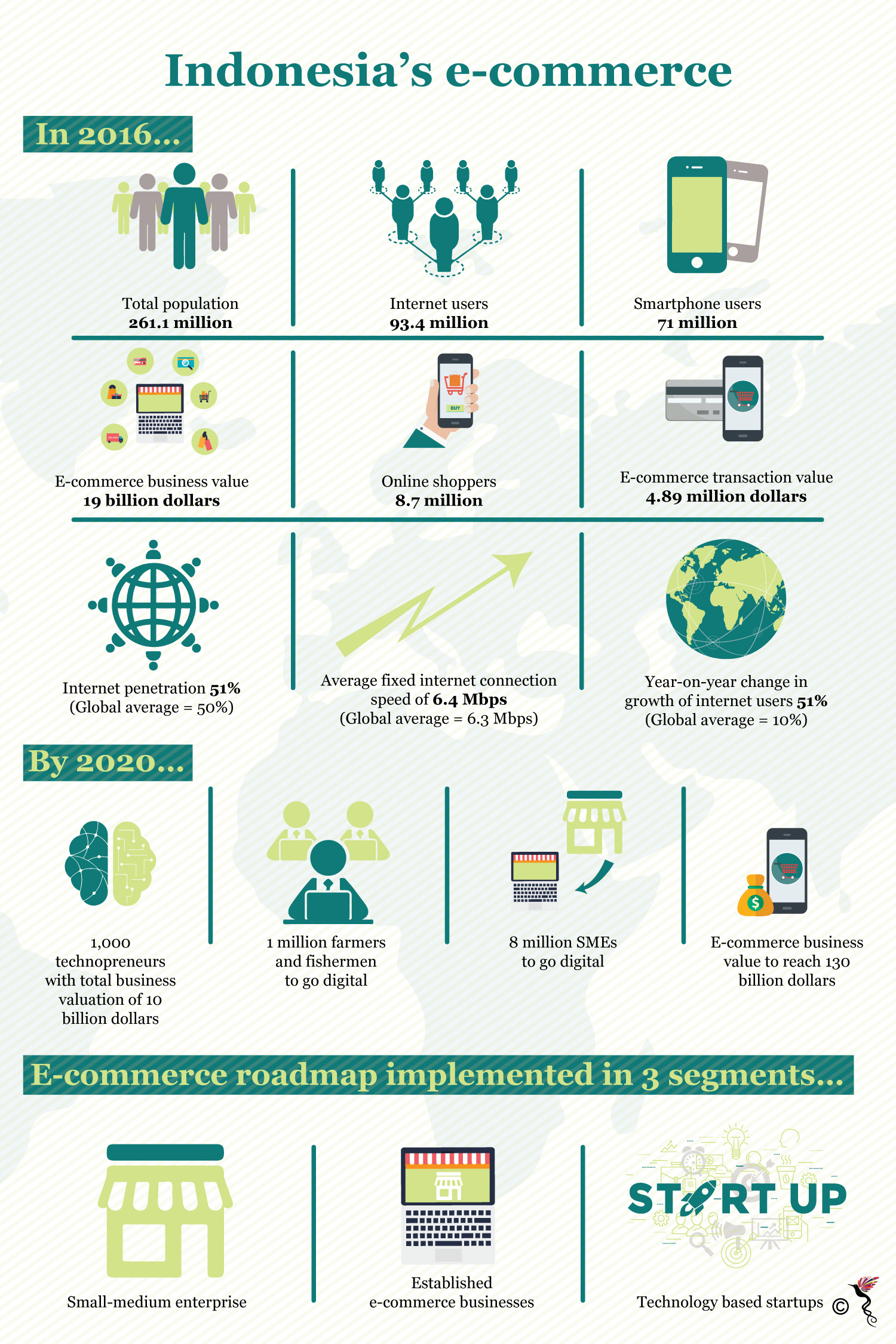Indonesia’s e-commerce market is targeted to grow from 19 billion dollars in 2016 to 130 billion dollars in 2020, according to data obtained from Indonesia’s ICT (Information and Communications Technology) Ministry. This puts Indonesia ahead in terms of digital economy growth against its other ASEAN counterparts – with a year-on-year growth of 51 percent. Indonesia’s growing digital economy is riding on its fast-growing usage of smartphones – which amounted to 71 million users in 2016. Out of the 261.1 million Indonesians, 93.4 million of them are internet users while 8.7 million of them shop online.

Indonesia’s e-commerce scene as compiled from the Digital in 2017 Growth Overview report by We Are Social and Hootsuite.
Indonesia’s e-commerce roadmap kicks off
The main objective of the roadmap is to boost growth in the e-commerce sector, with a long-term goal of stimulating Indonesia’s overall digital economy. The push for a stronger digital economy with the ongoing reforms in the e-commerce sector will drive a new growth engine for Indonesia. The e-commerce roadmap will provide guidelines for the country’s digital economy sector.
“The country needs e-commerce to empower the under-privileged. The problem is, we do not have a proper roadmap for e-commerce development that will act as a reference for stakeholders who want to explore the sector,” Indonesia's Coordinating Minister of Economic Affairs Darmin Nasution said in a press statement.
The Indonesian government first announced finalised plans to introduce the national e-commerce roadmap in January 2016. In August this year, Widodo finally signed the e-commerce roadmap for Indonesia – which will provide guidelines for the country’s digital economy sector. The e-commerce roadmap is expected to be officially issued by the end of 2017. Indonesian e-commerce steering committee rolled out a roadmap which will help to regulate technology and address related issues such as:
Funding: The government will run micro credit programmes to provide support to business app developers, business incubators and start-up mentorships. It will provide USO (universal service obligation) funds for digital small and medium enterprises (SMEs) as well as e-commerce start-ups. Additionally, fund-raising opportunities such as angel investment, seed capital, venture capital and crowd-funding have also been made available.
Taxation: The government will offer tax redemption for local start-up investors. Taxation procedure has been simplified for e-commerce ventures with a total turnover of below 362,593 dollars per year and tax regulations are made equal across all e-commerce entrepreneurs.
Consumer protection: The government will regulate all electronic transactions in order to encourage consumer as well as government-related transactions through e-commerce platforms. Develop a progressive NPG (national payment gateway).
Logistics: E-commerce businesses will be allowed to fully utilise the national logistics system, known as Sisiognas. Apart from that, the local and national courier companies are also tasked to strengthen routes between cities and rural areas.
Communications: Communication infrastructures will be strengthened through the national broadband development programme.
Cyber security: The government will set up a national surveillance and e-commerce monitoring system in order to create awareness about risks of cyber attacks on e-commerce while standardising data collection.
Execution and management: The formation of an operating management structure to manage, monitor, and evaluate the implementation of the e-commerce roadmap.
The Communications and Informatics Minister, Rudiantara in a press conference after the e-commerce coordination meeting, that was held at the Coordinating Ministry for Economic Affairs in Jakarta, Indonesia stated "one of the issues outlined in the roadmap which relates to the payment system will be addressed by implementing the NPG. This will be under the supervision of Bank Indonesia (the central bank of Indonesia).” The NPG will provide an efficient and secure payment system for consumers.
The ministry is also coordinating with the Ministry of Finance, Central Bureau of Statistics and Bank Indonesia to design a solution to record information from online transactions that they receive from the marketplace. Currently, they are in the midst of discussion with e-commerce businesses on how this information can be extracted without having to create a new system.
Poor infrastructure remains a challenge
Indonesia’s poor infrastructure can be a stumbling block in the growth of the nation’s digital economy. “It is cheaper to ship a container of Chinese mandarin oranges from Shanghai to Jakarta than to send similar freight from Jakarta to Padang in West Sumatra, even though the distance between the two Indonesian cities is one sixth of the distance between Jakarta and Shanghai,” noted 2016 World Bank report. Such inefficiencies make it tough for firms to improve their logistics systems and it slows the delivery of goods purchased online. “Improved logistics for better connectivity will have significant effects on the country’s competitiveness as well as on poverty. Better logistics can reduce the cost of essential goods and services, particularly in more remote and less developed parts of the country,” said the World Bank country director for Indonesia Rodrigo Chaves. The World Bank has approved 400 million dollars worth of financing to improve the nation’s logistics.
According to a statement released by the Alibaba Group, infrastructure and logistics are the key challenges to Indonesia’s expanding e-commerce industry. “Indonesians live across more than 17,000 islands, putting in place a comprehensive logistics network is a key challenge faced by the country’s e-commerce industry,” read the statement by Alibaba – which was released following Jack Ma’s (Alibaba Group's founder) meeting with Nasution and Rudiantara in Beijing, China late August. “To overcome this, two basic infrastructure issues need to be resolved with regards to the information network and logistics network. To that end, Alibaba has cordially invited Indonesian government officials to visit the company’s headquarters in Hangzhou, China to gain first-hand knowledge and experience on China’s e-commerce development through knowledge sharing sessions and courses,” the statement said.
Ma is set to be the advisor for the Indonesian e-commerce steering committee which is headed by Nasution. He will advise on the development of electronic trades and human resources, as well as assist the Indonesian government in driving Indonesia towards becoming a development centre for human resources in Asia’s digital economy.
Indonesia aims to achieve an e-commerce market valuation of 130 billion dollars by 2020. In order to achieve this goal, the Indonesian government is working towards creating 1,000 technopreneurs with a total business valuation of 10 billion dollars by then.
The Indonesia’s e-commerce market is forecasted to reach 130 billion dollars by 2020. Also, within the same period of time, the government aims to digitalise as well as eight million SMEs (small medium enterprises). Moving forward, the implementation of the e-commerce roadmap is certainly crucial in giving Indonesia the much-required digital push.
